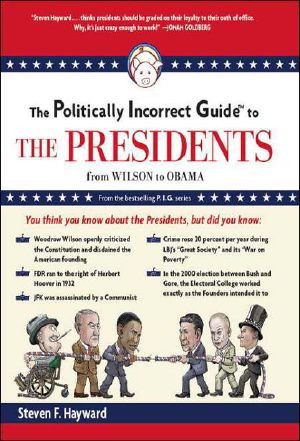The Politically Incorrect Guide to the Presidents · From Wilson to Obama

- Authors
- Hayward, Steven F.
- Publisher
- Regnery Publishing
- Tags
- history , non-fiction , patriot bookshelf
- ISBN
- 9781596987760
- Date
- 2012-02-13T00:00:00+00:00
- Size
- 0.41 MB
- Lang
- en
What Makes a President Great?
Academics, journalists, and popular historians agree. Our greatest presidents are the ones who confronted a national crisis and mobilized the entire nation to face it. That’s the conventional wisdom. The chief executives who are celebrated in textbooks and placed in the top echelon of presidents in surveys of experts are the “bold” leaders— the Woodrow Wilsons and Franklin Roosevelts— who reshaped the United States in line with their grand “vision” for America.
Unfortunately, along the way, these “great” presidents inevitably expanded government— and shrunk our liberties.
As the twentieth-century presidency has grown far beyond the bounds the Founders established for the office, the idea that our chief executive is responsible to “preserve, protect, and defend the Constitution of the United States” has become a distant memory.
Historian and celebrated Reagan biographer Steven F. Hayward reminds us that the Founders had an entirely different idea of greatness in the presidential office. The personal ambitions, populist appeals, and bribes paid to the voters with their own money that most modern presidents engage in would strike them as instances of the demagoguery they most feared— one of the great dangers to the people’s liberty that they wrote the Constitution explicitly to guard against. The Founders, in contrast to today’s historians, expected great presidents to be champions of the limited government established by the Constitution.
Working from that almost forgotten standard of presidential greatness, Steven Hayward offers a fascinating off–the–beaten–track tour through the modern presidency, from the Progressive Era’s Woodrow Wilson to Barack Obama. Along the way, he serves up fresh historical insights, recalls forgotten anecdotes, celebrates undervalued presidents who took important stands in defense of the Constitution— and points the way to a revival of truly constitutional government in America.
What you didn’t learn from your history teacher, but will find in The Politically Incorrect Guide™ to the Presidents:Progressive hero Woodrow Wilson aired a pro–Ku Klux Klan movie at the White HouseCalvin Coolidge, much mocked by liberal historians as a bland Babbitt, was the last president to write his own speeches, guided the country through years of prosperity and limited government, and was one of the most cultured men ever to live in the White HouseWhy Eisenhower’s two biggest mistakes as president were, in his own words “both sitting on the Supreme Court”How as president JFK took mind–altering drugs, many of them prescribed by a physician he called “Dr. Feelgood,” who later lost his medical license for malpracticeNixon’s hysterically vilified Christmas bombing of North Vietnam in 1972 caused very few civilian casualties and compelled North Vietnam to negotiate an end to the Vietnam WarThe misunderestimated George W. Bush read 186 books during his presidency, mostly non–fiction, biography, and history
Review“Steven Hayward, one of my favorite historians and writers, has some pretty whacky ideas. For example, he thinks presidents should be graded on their loyalty to their oath of office. Why, it’s just crazy enough to work! Read this book not only because it is entertaining, insightful, and informative but also because it’s the perfect antidote to presidential grade inflation.”—Jonah Goldberg, editor-at-large of National Review Online and author of Liberal Fascism: The Secret History of the American Left from Mussolini to the Politics of Meaning
“One of the keys to restoring the government to its proper limits will be to have our presidents serve in their originally intended role as defenders of the Constitution, rather than undermining it through endless expansions of the administrative state. It is surprising how seldom we evaluate presidents according to whether they live up to their oath of office, and we have Steven Hayward to thank for reminding us of the presidents who understood this, and those who didn’t.”—Edwin Meese III, Attorney General in the Ronald Reagan administration and Chairman of the Center for Legal and Judicial Studies at the Heritage Foundation
“Every president takes an oath to protect and defend the Constitution of the United States. But how well do they perform this basic duty? Modern historians have mostly ignored this question, but Steven Hayward tackles it head on, grading the presidents of the last hundred years. He’s a tough grader, and his conclusions will surprise—and delight—many readers.”—Michael Barone, senior political analyst at the Washington Examiner and co-author of The Almanac of American Politics
From the Back CoverGrading the presidents—by the Constitution
For a century after the founding, presidents routinely vetoed bills they believed unconstitutional and regularly spoke to the American people on the subject of constitutional government. But beginning with Woodrow Wilson in the Progressive Era, some chief executives have actively sought to undermine the Constitution, and in recent years many presidents have been negligent or simply ignorant about their constitutional responsibilities.
In The Politically Incorrect Guide™ to the Presidents, presidential historian Steven Hayward revives the original standard for judging our presidents. You’ll not only discover which presidents get an F on their efforts to preserve, protect, and defend the Constitution, but also learn about some of the underappreciated constitutional heroes who have been elected to the White House.
Along the way, you’ll also learn:How the much ridiculed Calvin Coolidge was actually one of our most intellectual presidents, reading classics in the original Greek and Latin for relaxation at night in the White HouseHow Herbert Hoover, a strong anti-Communist, may have assured the success of the Bolshevik revolution in RussiaWhy Eisenhower deliberately stumbled his way through his rare press conferencesHow Barack Obama wanted to include Hiroshima and Nagasaki on his world apology tour, but the Japanese government said no thanks